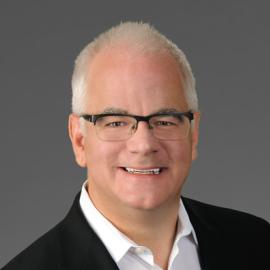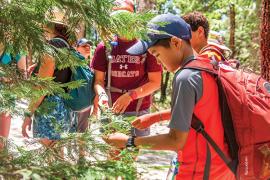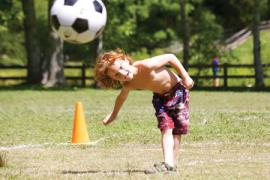
I recently attended an inspiring call-to-action presentation by Karen Pittman and Merita Irby. These thought leaders cofounded the Forum for Youth Investment and devote their time to synthesizing research, policy, and practice resources at the intersection of equitable youth development and education (Pittman & Irby, 2023).
Pittman and Irby are rallying positive youth development partners and community-based organizations in the out-of-school-time (OST) space to lead the way on new models of learner-centered education. They want to inspire innovative strategies to address the devastating COVID-19 learning loss crisis across our country.
When I think about effective learner-centered education, I think about quality camp programs! Amid all the fun and adventure at camp, young people develop collaborative problem-solving skills, practice critical-thinking, learn to make independent choices, and reflect on their learning. Camp is an exquisite project-based learning laboratory.
Pittman and Irby underscored for me the unnerving developmental and educational impacts of the pandemic. They further detailed the ascendance of brain research on the criticality of positive social connections for healthy adolescent development and the imperative nature of equitable access to immersive summer learning. These truths have created a formidable point of inflection for the field of camp.
In a recent analysis, Margaret Raymond, PhD, founding director of the Center for Research on Education (CREDO) at Stanford University, estimated that even if a school district could offer students five more years of education beyond the normal 12, only about 75 percent of students would be at grade level by high school graduation. Raymond said current efforts to address COVID learning loss, such as tutoring and summer school, are doomed to fail — especially for students with slower learning paces, who gain less than a full day of learning from every day of instruction (Raymond, 2023). Like OST thought leaders Pittman and Irby, as an education policy thought leader Raymond issues a call to make the necessary, deep alterations to K–12 education now before it’s too late.
I believe it’s time for OST leaders like you and me to help close the educational gaps. Leveraging positive youth-development engagement strategies from quality camp experiences, we can focus on under-resourced, high-need learners.
Recent neuroscience research supports the premise that adolescents are “wired to connect” socially. And when that connection is positive, it results in better outcomes for them concurrently and over time (Morris et al., 2018). On the other hand, when there is family conflict, misbehavior, bullying, social exclusion, or other abuse, adolescents are more likely to develop neurological circuitry that puts them at risk for mental illness. Camps provide young people with an emotionally and physically safe environment where they have a measure of independence from their parents and can build peer and near-peer relationships in healthy communities of belonging. The strength of camps’ enduring social and emotional connections provides a powerful catalyst for positive risk-taking, youth development, and growth mindset.
Please explore opportunities to initiate and participate in camp-school partnerships in your local community to help demonstrate the impact of expanded learning programs at quality camps in collaboration with local school districts or charter networks. The results of the ACA/National Summer Learning Association Camp-School Partnership Demonstration Project over the past two summers are exciting, and I believe this is one of the ways camp professionals and ACA can work with K–12 educators to benefit all young people.
Thank you for all you continue to do to inspire and lead young people and their families to thriving lives through your work at camp!
“Every great dream begins with a dreamer. Always remember, you have within you the strength, the patience, and the passion to reach for the stars to change the world.” – Harriet Tubman
References
- Morris, A. S., Squeglia, L. M., Jacobus, J., & Silk, J. S. (2018, February 20). Adolescent brain development: Implications for understanding risk and resilience processes through neuroim¬aging research. Journal of Research on Adolescence. onlinelibrary.wiley.com/doi/10.1111/jora.12379
- Pittman, K. J. & Irby, M. (2023, May 23). Centering youth thriving initiative briefing (Zoom). Knowledge to Power Catalysts. kpcatalysts.com/
- Raymond, M. (2023, April 24). The terrible truth: Current solutions to COVID learning loss are doomed to fail. The 74. the74million.org/article/the-terrible-truth-current-solutions-to-covid-learning-loss-are-doomed-to-fail


